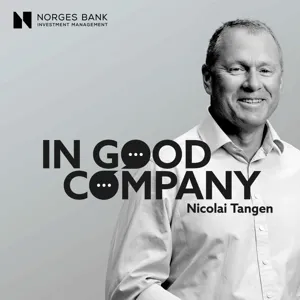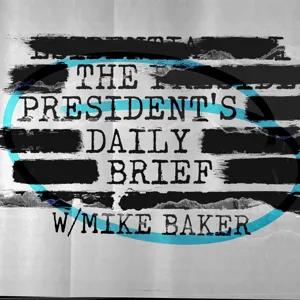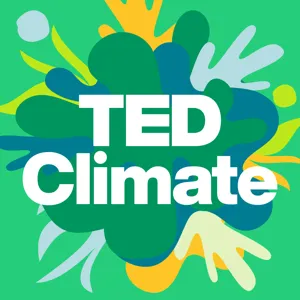Bill Gates

Hosted on Acast. See acast.com/privacy for more information.
Explore "clean energy" with insightful episodes like "Bill Gates", "Brian Deese on the Legislative Legacy of President Biden's First Two Years", "Thermonuclear fusion: A star on earth to power the world?", "January 9th, 2023. Biden, Trudeau, and AMLO Meet to Discuss Drugs, Trade, and Immigration." and "A Step Closer To Nuclear Fusion Energy" from podcasts like ""In Good Company with Nicolai Tangen", "Odd Lots", "Stories of our times", "The President's Daily Brief" and "Short Wave"" and more!

Hosted on Acast. See acast.com/privacy for more information.

President Biden came into office with an incredibly slim legislative majority. And yet despite just 50 Democratic seats in the Senate, the first two years of Biden's Presidency saw the passage of some extremely ambitious laws. The potential exists for the infrastructure bill, the CHIPS Act, and the Inflation Reduction Act to reshape the economy in ways that we haven't seen in a long time. Brian Deese has been the head of the National Economic Council these last two years, and was thus directly involved in the passage and shaping of these laws. So what will they accomplish, and how will they ultimately be judged. We spoke to Brian in his final week in the NEC role about this new era of "industrial strategy", and what he learned during this two-year stint.
See omnystudio.com/listener for privacy information.

At an experimental nuclear reactor in the south of France, 35 countries are trying to build a star on earth. It's just one of several facilities around the world where scientists are trying to create the future of energy. If they pull it off, thermonuclear fusion could solve the world’s energy crisis, efficiently creating almost limitless clean energy.
This podcast was brought to you thanks to the support of readers of The Times and The Sunday Times. Subscribe today: thetimes.co.uk/storiesofourtimes.
Guest: Constance Kampfner, Reporter, The Times.
Host: Manveen Rana.
Clips: The B1M, DW News, BBC, Vox, PBS, NBC, ShadowZone, Real Engineering, Tokamak Energy.
Hosted on Acast. See acast.com/privacy for more information.




In the past few months, Joe Biden’s agenda has gone from a failed promise to real legislation.
Taken together, the CHIPS and Science Act and the Inflation Reduction Act (along with the Bipartisan Infrastructure Act) have the potential to put America on a path to decarbonization, develop some of the most advanced and crucial supply chains in the world, and build all kinds of next-generation technologies. It’s hard to overstate just how transformative these plans could be if they are carried out in the right way.
But that’s a big “if.” Because Biden’s legacy will not be written just in tax code and regulatory law. All of this legislation is about building things in the real world — from wind farms to semiconductor manufacturing plants to electric vehicle charging stations and so much more. Which means the hard work isn’t over. It’s just beginning.
Felicia Wong is the president and chief executive of the Roosevelt Institute and someone who has had an unusually clear read of the Biden administration from the beginning. Wong has been arguing that Biden wants to fundamentally reshape the productive capacity of the economy. And now he’s gotten approval of bills that have the potential to do just that. But Wong is also realistic about the obstacles in the way of realizing that project. And so the question at the center of this conversation is: What will it take to turn the Biden agenda from written legislation into lived reality?
We also discuss the death of the “care infrastructure” for helping families that was at the heart of the Build Back Better proposal, the challenges of building up the American semiconductor industry, why some progressives view these bills as “corporate welfare,” the conservative argument that government shouldn’t be “picking winners and losers,” how these bills could respond to America’s deep regional inequalities, how to address the problem of NIMBYism, what participatory budgeting and worker cooperatives can teach us about better ways to represent community voices, why we should want the government to take bigger risks even if that means more government failure, and much more
Mentioned:
“All Biden Has to Do Now Is Change the Way We Live” by Ezra Klein
Book recommendations:
The Middle Out by Michael Tomasky (accompanied by new podcast, "How to Save a Country")
Elite Capture by Olúfẹ́mi O. Táíwò
Chords of Change (forthcoming 2023) by Deepak Bhargava and Stephanie Luce
Thoughts? Guest suggestions? Email us at ezrakleinshow@nytimes.com.
You can find transcripts (posted midday) and more episodes of “The Ezra Klein Show” at nytimes.com/ezra-klein-podcast, and you can find Ezra on Twitter @ezraklein. Book recommendations from all our guests are listed at https://www.nytimes.com/article/ezra-klein-show-book-recs.
“The Ezra Klein Show” is produced by Annie Galvin and Rogé Karma. Fact-checking by Michelle Harris, Mary Marge Locker and Kate Sinclair. Original music by Isaac Jones. Mixing by Carole Sabouraud and Isaac Jones. Audience strategy by Shannon Busta. Special thanks to Kristin Lin and Kristina Samulewski.

Sunday show! On VC Sunday School, J+M discuss how VCs deploy reserves for follow-on funding. (1:58) Then, Molly interviews Quaise CEO & Co-Founder Carlos Araque about his geothermal drilling business! (24:02)
(0:00) J+M tee up segments for Sunday!
(1:58) Jason and Molly talk about how VCs deploy reserves for follow-on funding and bankroll management
(10:31) OpenPhone - Get an extra 20% off any plan for your first 6 months at https://openphone.com/twist
(11:47) Golden State Warriors impact on Jason's system-based VC team building philosophy
(15:48) J+M tee up today's TWiCS interview!
(22:46) Neo.Tax - Get $500 off R&D tax credit fees at https://neo.tax/twist
(24:02) Quaise CEO Carlos Araque joins to break down his business: drilling to unlock geothermal energy
(33:03) Helpware - Go to https://helpware.com/TWIST to get $1000 off your first invoice
(34:10) Carlos explains the size of Quaise's opportunity and how he raised $50M+ Series A for a deep tech project, what their business model will look like, and more!
Check out Quaise: https://www.quaise.energy
FOLLOW Jason: https://linktr.ee/calacanis
FOLLOW Molly: https://twitter.com/mollywood
Subscribe to our YouTube to watch all full episodes: https://www.youtube.com/channel/UCkkhmBWfS7pILYIk0izkc3A?sub_confirmation=1

First up on VC Sunday School, J+M cover the stigma around investing in first-time founders: Is it a myth? What are the pros and cons? What really matters when evaluating a founder? (3:01) Then, Molly interviews Jay Koh of The Lightsmith Group to break down the Inflation Reduction Act's $369B climate/energy allocation. (29:08)
(0:00) Jason and Molly tee up today's segments!
(3:01) why is there a bias against investing in first-time founders?
(15:04) OpenPhone - Get an extra 20% off any plan for your first 6 months at https://openphone.com/twist
(16:21) Most important factors to startup success
(21:42 Jason and Molly tee up Molly's climate interview which is focused on the Inflation Reduction Act's $369B climate/energy carve-out
(27:53) MasterClass - Get 15% off an annual membership at https://masterclass.com/startups
(29:08) Jay Koh of The Lightsmith Group joins to break down the $369B earmarked for climate/energy in the Inflation Reduction Act
(36:39) Odoo - Get your first app free and a $1000 credit at https://odoo.com/twist
(37:58) What will the $369B do for the climate VC industry?
(48:48) What will this investment do for America's standing as a global climate tech leader?


Growing up in Colombia, Carlos Araque and his father liked to take apart bicycles and motorcycles then put them back together. This love of tinkering led Carlos to study engineering at MIT and eventually launch a career in the oil and gas industry. After 15 years of this work, Carlos realized he was uniquely suited to be a part of the global energy transition away from fossil fuels. He returned to his alma mater to help run a startup accelerator, and soon, Quaise Energy was born.
This week on How I Built This Lab, Carlos shares how his company plans to drill the deepest holes ever to unlock the nearly limitless potential of geothermal energy. Carlos explains why he sees such promise with this energy source and how he spread his optimism to investors to raise more than $70 million and counting.
See Privacy Policy at https://art19.com/privacy and California Privacy Notice at https://art19.com/privacy#do-not-sell-my-info.

0:00 Bestie intros!
2:19 GDP growth is negative for a second consecutive quarter, but is the US actually in a recession? How has the White House controlled the narrative?
22:45 Looking at COVID trends with a post-COVID view: e-commerce, remote work, and how they correlate
36:33 "Inflation Reduction Act", how government subsidies can stifle innovation
59:50 Alzheimer's fraud, Ginkgo acquires Zymergen for $300M
1:17:36 Democrats backing MAGA candidates in primaries vs. more moderate republicans: savvy and cynical or too risky?
Follow the besties:
https://twitter.com/DavidSacks
Follow the pod:
https://twitter.com/theallinpod
https://linktr.ee/allinpodcast
Intro Music Credit:
https://twitter.com/yung_spielburg
Intro Video Credit:
https://twitter.com/TheZachEffect
Referenced in the show:
https://news.shopify.com/changes-to-shopifys-team
https://www.google.com/finance/quote/TDOC:NYSE
https://twitter.com/jamiedupree/status/1552406981637545993
https://www.nytimes.com/2022/07/24/world/africa/congo-oil-gas-auction.html
https://www.nature.com/articles/s41380-022-01661-0
https://www.pharmaceutical-technology.com/news/ginkgo-acquire-zymergen/
https://www.nytimes.com/2022/07/26/us/politics/democrats-john-gibbs-peter-meijer.html
https://twitter.com/ConanOBrien/status/1552358211986006019
https://twitter.com/maga_cy/status/1552360064693915648

When Donnel Baird was a child, his parents would regularly use the oven to heat their Brooklyn apartment — a dangerous and energy-inefficient practice that’s unfortunately not unique to New York City. As an adult traveling the country with the Obama for America campaign, Donnel saw countless homes and apartments wasting power and jeopardizing resident safety because of dated infrastructure. He founded BlocPower in 2014 to address this precise problem, focusing on low-income communities so often overlooked by innovative startups.
This week on How I Built This Lab, Donnel talks with Guy about BlocPower’s work to modernize buildings nationwide and transition them to clean energy sources. BlocPower has raised more than $100 million from Wall Street and Silicon Valley investors, and has partnered with cities across the country to create greener, safer spaces for their residents.
See Privacy Policy at https://art19.com/privacy and California Privacy Notice at https://art19.com/privacy#do-not-sell-my-info.


In the high-stakes competition to dominate the business of clean energy, the Democratic Republic of Congo is a major arena: The country is the source of more than two-thirds of the world’s cobalt, a key component of electric-car batteries.
In recent years, China has established a strong presence in Congo, while the United States has lost ground. We went to the African country to understand how that happened.
Guest: Dionne Searcey, a correspondent for The New York Times.
Have you lost a loved one during the pandemic? The Daily is working on a special episode memorializing those we have lost to the coronavirus. If you would like to share their name on the episode, please RECORD A VOICE MEMO and send it to us at thedaily@nytimes.com. You can find more information and specific instructions here.
Background reading:
Want more from The Daily? For one big idea on the news each week from our team, subscribe to our newsletter.
For more information on today’s episode, visit nytimes.com/thedaily. Transcripts of each episode will be made available by the next workday.

Jason and Molly cover how 15% of the world’s bitcoin mining network going down when Kazakhstan’s internet was shut off (3:11) and Chainalysis' scam report (12:32). Then they do a "We Live in the Future" segment about AI created actors (16:49) and “Memes of the Week” review of Marc Andreessen's tweets (25:32). Finally, Producer Rachel wraps with an "OK Boomer" interview with YouTube creator and software engineer Ben Awad (38:43).
(00:00) Jason and Molly intro the show
(01:15) A special welcome video for Molly
(03:11) Kazakhstan crypto
(10:42) OpenPhone - Get an extra 20% off any plan for your first 6 months at https://openphone.com/twist
(12:32) Chainalysis 2021 Crypto Crime Report
(16:49) WLITF Synthesia replacing cameras with code
(21:06) Ourcrowd - Check out the deal of the week at https://ourcrowd.com/twist
(22:26) Possibilities for AI deepfakes
(25:32) Memes of the Week - Marc Andreessen
(34:18) OK Boomer - Producer Rachel introduces the guest
(37:12) Revelo - Get 20% off the first 3 months by mentioning TWIST at https://revelo.io/twist
(38:43) Ben Awad Gen Z Programming Mentor
FOLLOW Ben: https://twitter.com/benawad
FOLLOW Jason: https://linktr.ee/calacanis
FOLLOW Molly: https://twitter.com/mollywood


In 2020, China's President Xi Jinping pledged that China would both peak its emissions by 2030 and achieve net-zero emissions by 2060 -- a change that will require action at an unheard-of scale and speed. Can the country actually achieve this ambitious vision? In this forward-looking talk, environmental journalist and analyst Hongqiao Liu explores what the world's largest carbon emitter (and second-largest economy) will need to do to get there.

To fight climate change, we need to clean up the global electricity system by replacing fossil fuel power plants with clean generation -- right? Climate author Solomon Goldstein-Rose thinks we need to do much more than that. Replacement isn't enough, he explains in this compelling talk: we need to rapidly develop a new global system capable of producing 12 times the amount of clean electricity we generate today. He shares four reasons why we need that expansion -- first, to electrify everything in all parts of the world (not just the wealthy ones) -- as well as some intriguing ideas for how we can get there.

In a giant conference hall in Glasgow, leaders from around the world have gathered for the Conference of Parties to the United Nations Climate Change Convention, or COP26. This is the 26th such session.
Many say this may be the last chance to avoid climate disaster. Will anything change this time?
Guest: Somini Sengupta, the international climate reporter for The New York Times.
Sign up here to get The Daily in your inbox each morning. And for an exclusive look at how the biggest stories on our show come together, subscribe to our newsletter.
Background reading:
For more information on today’s episode, visit nytimes.com/thedaily. Transcripts of each episode will be made available by the next workday.
Stay up to date
For any inquiries, please email us at hello@podcastworld.io